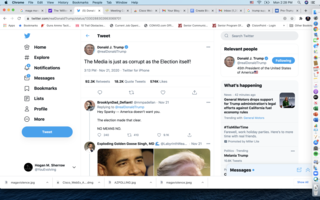In my previous entry, I made the argument that Donald Trump and his proponents should be considered a “cult.” I demonstrated the classic behaviors, including; unquestioning allegiance to a single charismatic leader, belief in whatever that leader says as being law or the “real” truth, and a belief that those within the group are superior to outsiders—in this case, regarding patriotism. What’s important is that this behavior threatens democracy.
Democracies (even those that are technically Democratic Republics) require certain elements to survive, and ultimately to thrive. Political Scientist Larry Diamond asserts that democracies consist of four basic elements:
- A political system for choosing and replacing the government through free and fair elections.
- The active participation of the people, as citizens, in politics and civic life.
- Protection of the human rights of all citizens.
- A rule of law, in which the laws and procedures apply equally to all citizens.
It is essential that the majority of citizens agree upon these elements for a democracy to function. But these elements have been ignored or called into question, without evidence.
As the 2020 Presidential election unfolded and Joe Biden and Kamala Harris began to secure the 270 electoral votes needed to win, Mr. Trump increased his claims about fraud, that the election was rigged, and that he actually won.
His proponents stormed election locations, demanding in some states that all the votes be counted, while simultaneously calling for the halt of vote counting in other states. In Georgia and Arizona, election officials received death threats. The threat in Arizona was posted on Parler, a conservative social media platform.
Meanwhile, the rest of the world, including Christopher Krebs, the head of cybersecurity in the current administration, has acknowledged that this was the most secure election in American history. Despite the evidence that the election was fair, and that Mr. Biden won in both the popular vote and the electoral college, Mr. Trump refused to accept the outcome and even fired Krebs.
Of those who voted for Trump, 78 percent believe that the election was rigged. Instead of dealing with the loss and preparing to move forward in a way consistent with our laws, many people are prepared to go to “civil war” with the American political left. This level of allegiance goes beyond typical in-group behavior, it's alarming and further supports my premise of cult-like behavior. By mistrusting anyone outside the group and threatening civil war, Mr. Trump's proponents are engaging in dangerous behaviors that threaten our ability to conduct free and fair elections, protect the rights of all citizens, and follow the rule of law. They have constructed a safe space, echo-chamber, where only the messages and alternative narratives produced by their in-group come through.

For a democracy to function, it must have four basic elements agreed upon by its citizenry. Everyone need not agree on who is best to lead the democracy, or what policies the democratic government should enact. However, the citizenry needs to be active in politics and civil life, in an educated, open way. Leaders need to be replaced with regular free and fair elections. The human rights of all citizens must be protected, and the rule of law must be applicable to all citizens, including elected officials. The attacks on this election have inspired people to doubt whether or not it was free and fair. Further, this devotion severely limits the ability to understand and accept new information, and openly engage in the political system.
It is unlikely that President-elect Biden will receive cooperation or even acceptance. Instead, the divisions in our country are likely to become even more entrenched.
"behavior" - Google News
November 26, 2020 at 05:30AM
https://ift.tt/2JepZnO
The Impact of Cult-like Behavior on Democracies - Psychology Today
"behavior" - Google News
https://ift.tt/2We9Kdi
Bagikan Berita Ini














0 Response to "The Impact of Cult-like Behavior on Democracies - Psychology Today"
Post a Comment